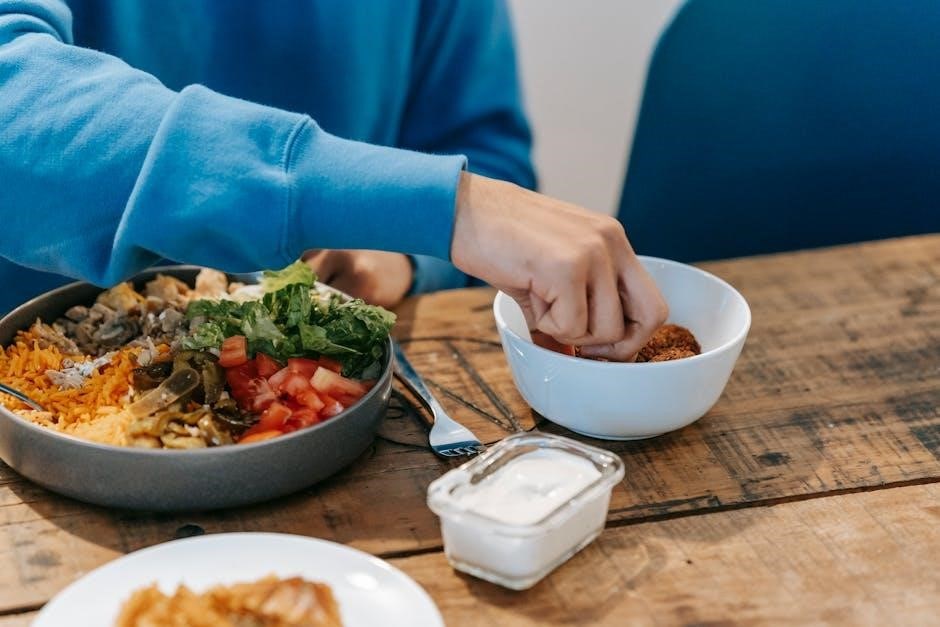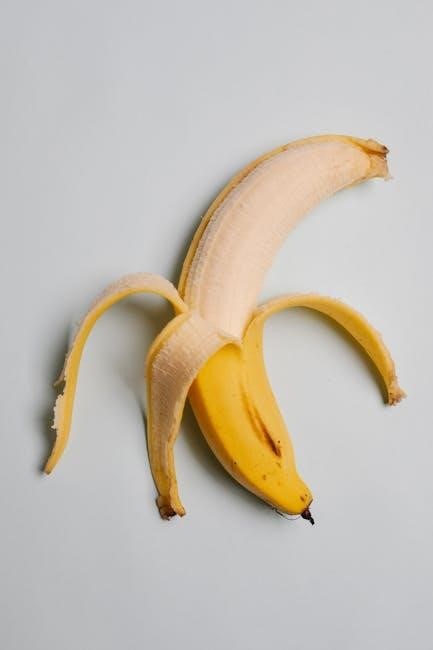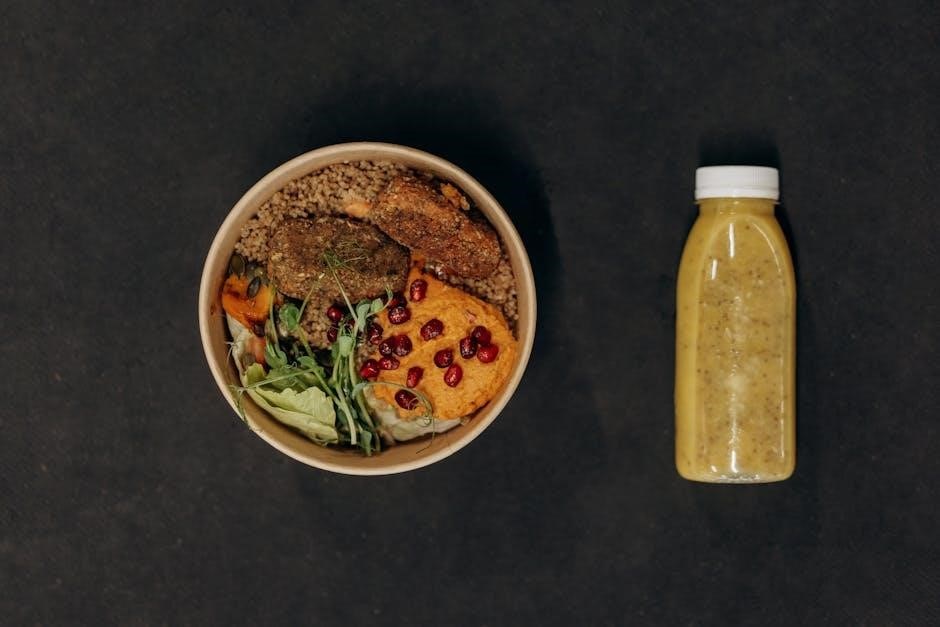1000 calorie meal plan pdf
- by stefanie

A 1000 calorie meal plan is a structured approach to weight loss, offering daily recipes, portion guides, and expert tips. It’s designed for safe, sustainable results, with vegetarian and low-fat variations available.
Overview of the 1000 Calorie Diet
A 1000 calorie diet is a low-calorie meal plan designed for weight loss, typically suitable for individuals with a smaller frame or those who are less active. It focuses on creating a calorie deficit to promote fat burning while maintaining essential nutrients. The plan is structured around three main meals and snacks, ensuring balanced nutrition. Protein, fiber, and healthy fats are emphasized to keep you full and energized throughout the day. This diet is ideal for short-term weight loss goals but may not be sustainable for everyone in the long term. It is important to consult a healthcare provider before starting, especially for those with a low BMI or specific health conditions; The diet can be customized to suit vegetarian preferences and is supported by downloadable PDF guides for easy planning.
Benefits of a 1000 Calorie Meal Plan
A 1000 calorie meal plan offers several benefits for those aiming to lose weight effectively. It promotes rapid weight loss by creating a significant calorie deficit, helping you shed pounds quickly. This plan also encourages healthier eating habits, focusing on nutrient-dense foods like lean proteins, whole grains, and vegetables. It improves metabolic function by teaching your body to burn fat efficiently. Additionally, the structured nature of the plan helps with portion control and reduces overeating. The meals are often customizable, catering to vegetarian and low-fat preferences. Many resources, including downloadable PDF guides, provide recipes and tips to keep the diet interesting and sustainable. Overall, a 1000 calorie meal plan is a great tool for kickstarting weight loss while learning balanced eating habits. However, it’s important to ensure you’re meeting your nutritional needs and consult a healthcare provider before starting.

Safety and Suitability for Weight Loss
A 1000 calorie meal plan is generally safe for short-term weight loss, but its suitability depends on individual factors. It’s ideal for those with a significant amount of weight to lose, as it creates a calorie deficit that promotes fat burning. This plan is particularly effective for jumpstarting weight loss, especially when combined with regular physical activity. However, it may not be suitable for everyone, particularly those with a low BMI or certain health conditions. It’s crucial to ensure the diet is well-balanced, providing adequate protein, fiber, and essential nutrients to avoid deficiencies. Supplements may be necessary to fill nutritional gaps. Always consult a healthcare professional before starting a 1000 calorie diet to ensure it aligns with your health goals and needs. This approach is best used temporarily, as very low-calorie diets can be challenging to sustain long-term.

Understanding the 1000 Calorie Meal Plan
The 1000 calorie meal plan is a structured diet designed to promote weight loss through portion-controlled meals. It balances nutrients, offering flexibility with vegetarian and low-fat options for diverse preferences and lifestyles.
Macro Breakdown: Protein, Carbs, and Fats
The 1000 calorie meal plan ensures a balanced intake of macronutrients. Protein typically ranges from 60-80 grams per day, supporting muscle maintenance and satiety. Carbohydrates are kept low, focusing on complex sources like whole grains and vegetables, to stabilize blood sugar levels. Fats are minimized but still present in healthy forms, such as avocado and nuts, to provide essential fatty acids. The plan emphasizes nutrient-dense foods, ensuring vitamins and minerals are not compromised despite the calorie restriction. This balance helps maintain energy levels while promoting weight loss effectively.
Sample Daily Menu Options
A typical day on the 1000 calorie meal plan includes nutrient-rich, portion-controlled meals. Breakfast might feature 2 scrambled eggs, a small whole wheat tortilla, and a serving of fresh berries, totaling around 200 calories. Lunch could include grilled chicken breast, steamed vegetables, and a side of quinoa, totaling approximately 300 calories. Dinner might consist of baked salmon, roasted sweet potatoes, and green beans, totaling about 350 calories. Snacks are optional but should be low-calorie, such as a handful of almonds or a small apple. The plan emphasizes whole, unprocessed foods to ensure maximum nutritional value while staying within the calorie limit. These meals are designed to be delicious, balanced, and easy to prepare, helping you stay on track with your weight loss goals.
Vegetarian and Low-Fat Variations
The 1000 calorie meal plan offers versatile vegetarian and low-fat options to cater to diverse dietary preferences. For breakfast, consider a egg and avocado wrap with a whole wheat tortilla, totaling 250 calories. Lunch might include a lentil and vegetable soup with a side of mixed greens, totaling 300 calories. Dinner could feature grilled tofu with roasted vegetables and quinoa, totaling 350 calories. Snacks like fresh fruit or yogurt are great low-calorie additions. These variations ensure a balanced intake of protein, fiber, and healthy fats while keeping calories in check. The plan emphasizes plant-based proteins, whole grains, and vibrant vegetables, making it both nutritious and satisfying. Whether you’re vegetarian or simply looking to reduce fat intake, these options provide a delicious and sustainable way to achieve your weight loss goals.


Practical Tips for Success
Stay hydrated by drinking plenty of water throughout the day. Eat smaller, frequent meals to maintain metabolism and avoid hunger. Consistency and proper planning are key to achieving weight loss goals effectively.
Hydration and Meal Frequency
Drinking plenty of water is essential for any weight loss plan. Staying hydrated helps boost metabolism and suppresses appetite, making it easier to stick to your 1000-calorie diet. Aim for at least 6-8 glasses of water daily, or consider herbal teas and low-calorie beverages as alternatives. Additionally, eating smaller, more frequent meals throughout the day can help maintain energy levels and prevent excessive hunger. This approach supports a steady metabolism and ensures you stay on track with your calorie intake. Proper hydration and meal timing are crucial for maximizing the effectiveness of your 1000-calorie meal plan and achieving your weight loss goals sustainably.
Supplements and Nutrient Balance
A 1000-calorie meal plan may require supplements to ensure adequate nutrient intake. Low-calorie diets can sometimes lead to deficiencies in essential vitamins and minerals. Consider adding multivitamins or specific supplements like Vitamin D, iron, or B vitamins to fill nutritional gaps. Additionally, maintaining a balance of macronutrients (protein, carbs, and fats) is crucial for energy and overall health. Many PDF guides recommend consulting a healthcare professional to determine the best supplements for your needs. Staying nutrient-balanced helps prevent fatigue and supports metabolism, making your weight loss journey more sustainable. Regularly reviewing your meal plan and supplement routine ensures you meet daily nutritional requirements while staying on track with your calorie goals.
Avoiding Common Pitfalls
When following a 1000-calorie meal plan, it’s important to avoid common pitfalls that can hinder progress. One major issue is nutrient deficiencies, as low-calorie diets may lack essential vitamins and minerals. To combat this, ensure a variety of nutrient-dense foods and consider supplements. Another pitfall is dehydration, which can masquerade as hunger. Drinking plenty of water throughout the day helps maintain energy levels and supports metabolism. Additionally, avoid relying solely on processed foods, as they often lack fiber and nutrients. Skipping meals can also backfire, leading to overeating later. Finally, don’t underestimate the importance of meal variety to keep the plan sustainable and enjoyable. By addressing these challenges, you can stay on track and achieve your weight loss goals effectively.

Downloading and Using the PDF

Long-Term Sustainability and Health
A 1000-calorie meal plan is best suited for short-term weight loss. For long-term health, ensure balanced nutrition and consult a healthcare provider to avoid nutrient deficiencies and maintain overall well-being.
Free Resources and Printable Guides
Access free downloadable PDF guides for a 1000-calorie meal plan, complete with recipes, daily menus, and tips for success. These resources are designed to help you stay organized and committed to your weight loss journey. Printable versions allow you to easily track your progress and plan meals in advance. Many guides include customizable options to suit your dietary preferences, such as vegetarian or low-fat variations. With sample menus and nutritional breakdowns, these resources provide a clear roadmap for achieving your goals. They often include tips for avoiding common pitfalls and maintaining motivation. Download your free 14-day meal plan PDF today and start your path to a healthier lifestyle. Ensure to consult a healthcare provider before starting any new diet plan.
- Downloadable meal plans with recipes and tips
- Printable guides for easy tracking
- Customizable options for dietary needs
- Sample menus and nutritional insights

Customizing the Meal Plan
The 1000-calorie meal plan can be tailored to suit individual preferences and dietary needs. Users can choose from vegetarian or low-fat variations, ensuring a variety of delicious and nutritious options. Cultural adaptations, such as a Mexican-American meal plan, are also available, offering diverse flavors while maintaining calorie goals. Printable PDF guides allow for easy customization, enabling users to swap ingredients or adjust portion sizes as needed. This flexibility ensures the plan remains enjoyable and sustainable. Whether you prefer lean proteins, plant-based meals, or international cuisine, the 1000-calorie meal plan can be personalized to align with your lifestyle and taste preferences. Customize your plan today and take the first step toward achieving your weight loss objectives with a tailored approach.
- Vegetarian and low-fat options
- Cultural meal plan variations
- Flexible ingredient swaps
- Printable guides for easy adjustments

A 1000-calorie meal plan supports weight loss and overall well-being. While effective for short-term goals, long-term health requires balanced nutrition and adjustments to ensure sustainability and proper nutrient intake.
Long-Term Sustainability and Health

While a 1000-calorie meal plan can kickstart weight loss, it may not be sustainable long-term due to potential nutrient deficiencies and metabolic slowdowns. For lasting health, gradually increase calorie intake to a balanced level, ensuring adequate protein, fiber, and essential vitamins. Incorporate a variety of whole foods, including lean proteins, whole grains, and vegetables, to maintain energy levels and overall well-being. Consulting a nutritionist can help tailor the plan to individual needs, promoting a healthier lifestyle without extreme calorie restriction.
Related posts:
Discover a quick and easy 1000 calorie meal plan PDF, perfect for weight loss. Download now!
Posted in PDF